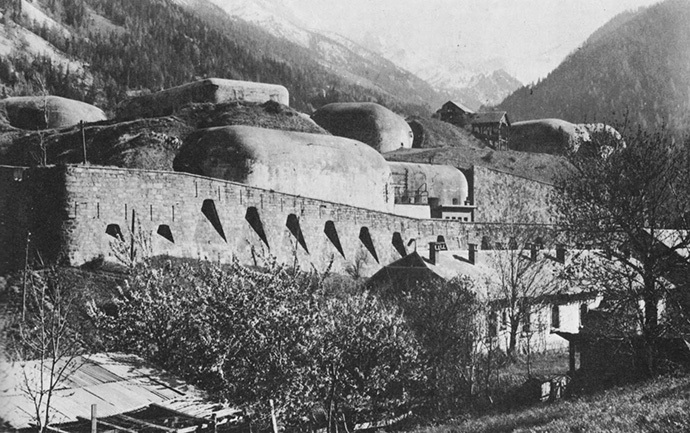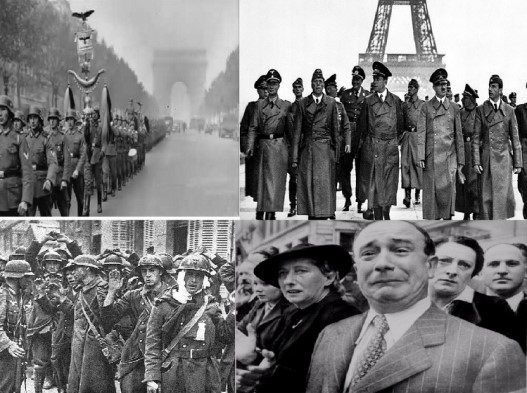France, which had declared war on Germany in September 1939, had the most powerful army in the world. The total number of French troops was over 2 million. It had three times the manpower and equipment of the Wehrmacht. The French air force included some 3,300 aircraft, half of which were the latest fighting machines. With the arrival of the British Expeditionary Corps, with 9 divisions and air regiments of 1,500 combat aircraft, the advantage over the German forces became even more apparent. By comparison, the Luftwaffe had only 1,186 aircraft (versus 4,800).
The French had an impregnable line of Maginot fortifications, which they had built for over 10 years. Some 3 billion francs ($1 billion) had been spent building the 400km line. The massive fortifications included multi-level underground forts with living quarters, ventilation systems and lifts, electrical and telephone exchanges, hospitals, and narrow-gauge railways. The four-meter-thick concrete wall protected the gun casemates from aerial bombardment. The number of French troops on the Maginot Line reached 300,000.

German Army Group “B” bypassed the main fortifications of the Maginot Line from the north. Germans attacked the areas built in the swampy terrain, where construction of underground structures was difficult.
The German war machine campaign lasted six weeks and ended with the surrender of France and the occupation of Northern Europe.
During the military operations from 10 May to 21 June 1940, the French army lost around 300,000 men killed and wounded. One and a half million Frenchmen were taken prisoner. The French armored corps and air force were partly destroyed and the rest became German booty. The British blew up the ships of the French fleet in the northern harbors to prevent them from going to the Germans.
During the six weeks of that war, the Wehrmacht lost more than 45,000 dead, and missing and wounded about 11,000 more.
On 17 June 1940, the French government met under the chairmanship of Marshal Petan. The ministers met for only 10 minutes. They unanimously decided to contact the German High Command and ask it to stop the war on French territory. The same day, Marshal Pétain addressed the people and the army by radio, urging them to stop the fighting.
The signing of the surrender was scheduled for noon on 21 June 1940. Hitler forced the French to sign the document in the same railroad car in the Campien Forest where, 22 years earlier, on 11 November 1918, the French Marshal Foch had dictated the terms of surrender to the German representatives. Now the sides had changed places.
Adolf Hitler arrived, accompanied by Ribbentrop, Hess, Göring, Brauchitsch, Keitel, and other military officials. French General Charles Huntziger led the French delegation.
Under the terms of the surrender, France would cease military operations throughout its territory, including its colonies. All weapons and ammunition were to be handed over to Germany. All German immigrants were to be handed over to Germany. The French navy and army undertook not to use force against Germany. After the terms of surrender had been read, a triumphant Hitler and his entourage left the place.

The British islands were completely blockaded by Dönitz’s submarines. During that year, Dönitz’s submarines sank three and a half million tonnes of cargo destined for Britain; the maritime empire was on the verge of collapse. At the most critical time for the country, Prime Minister Churchill addressed his people with the words: “You may despise Hitler’s system and still admire his patriotic achievement. If our country is defeated, I hope we shall have such an admirable leader to restore our courage and our place among other nations”.
Admiral Donitz moved part of his fleet to all the occupied ports on the Atlantic coast of France, allowing his U-boats to extend their range, reach Newfoundland, and sink convoys where, until recently, no one had expected the Germans to go.
England and France, who had declared war on Germany, were punished. Hitler then called for an end to their hostilities. In a speech to the Reichstag on 19 July 1940, Hitler said: “From London, I hear cries that the war must go on. But these are not the cries of the masses, they are the cries of politicians…believe me, I am inwardly disgusted with this kind of unscrupulous parliamentarians, destroyers of nations and countries. I never wanted war, I wanted to build a new state at the highest level. Every year of this war distracts me from my work. At this hour I feel it my duty to send another message to England. As the victor, I am not issuing an ultimatum, but I am speaking in the name of reason. I see no reason to continue this war….”
America shared Hitler’s fears. Earlier that year, Sommer Wells, a representative of the American government, met with European leaders. His task was to reconcile the warring parties and persuade them to find a diplomatic solution to the European conflict. In March, he was received by Hitler and during the conversation pointed out that Germany had not declared war on France and England, but on the contrary, England and France had declared war on Germany and were therefore responsible for the consequences. The American diplomat agreed with Hitler’s view.
But Churchill and his government had imperial ambitions. They rejected all of Hitler’s peace initiatives, ignored American Wells’ proposals, and wanted to continue the war.
Seeing the stubbornness of British politicians and the desire to continue the war on 16 July 1940, the General Staff approved the plan for operation “Sea Lion”, according to which 25 divisions of German troops under Field Marshal von Rundstedt were to cross the English Channel and land between Dover and Portsmouth.

But by this time Hitler had become aware of Stalin’s cunning plan to exploit the situation when the main Wehrmacht forces would go behind the Channel. Stalin was amassing his divisions in Poland for an invasion of Europe. Hitler canceled his decision to attack Britain and ordered the General Staff to prepare the “Barbarossa Plan” to stop invasion from Russia. The plan was adopted in early May 1941.
Hitler chose the day without reference to the position of the planets. He closely followed Stalin’s preparations and knew everything about the movements of his troops. The Germans had the most extensive spy network in the world and the most powerful optics on spy planes. Hitler realized that the Kremlin comrade would attack on the day when the concentration of his troops on the border reached its maximum. Hitler calculated this day by analyzing daily intelligence data on the arrival of new Soviet troops at the border. To ensure that the blow would be crushing, Hitler decided to preempt the wily Joseph on the night when the Russians would begin to remove the wire fences on the border.
The book contains facts that are completely unknown to most.
But these facts influenced the events known to the absolute majority.
© Copyright: Walter Maria, 2019 Certificate of publication #219110700796

Be First to Comment